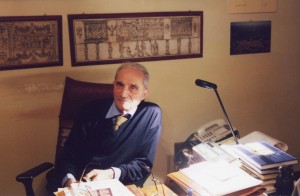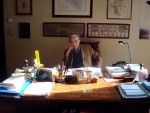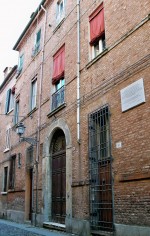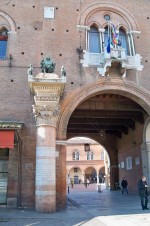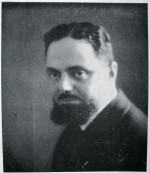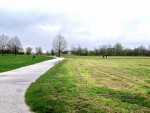Paolo Ravenna (Ferrara, 1926-2012)
A lawyer, he was the second son of Renzo Ravenna, podestà of Ferrara from 1926 to 1938. His biography is characterized by his commitment to the recovery and dissemination of the history and memory of the Jewish community of Ferrara and by action in the field of protection and enhancement of cultural and environmental heritage at the local and national levels.
1. Childhood and the Second World War
Paolo Ravenna was born in Ferrara on 6 March 1926, in one of the oldest families of the Jewish Community, the second son of Renzo Ravenna, who at the end of that year was appointed Podestà of Ferrara.
His life ran smoothly until 1938, when his father was forced to resign and he and his brothers were expelled from the city schools because of the racial laws. His older brother Tullio Ravenna was forced to emigrate to Fribourg in Switzerland to enrol at the university, while Paolo Ravenna and his younger sister Donata began attending the Jewish school in Via Vignatagliata.
In November 1943 the Ravenna family decided to try to escape to Switzerland: after a short stay in a first collection camp near Bellinzona, they were separated and Renzo and Paolo were transferred to Lugano, while Lucia Modena with her two youngest children was taken to the Rovio women's camp. They met in December 1943, but the daily difficulties of life in exile forced the Ravenna couple to send Donata to a family of friends in Freiburg and Paolo to an internment camp. In June 1944 Paolo Ravenna entered the labour camp of Haute-Nendaz in the Valais and then, in September, in the camp of Trevano, near Lugano, where he finished high school. In winter he was transferred to another camp near Lausanne where he began to attend the degree course in letters.
After the Liberation, Paolo Ravenna returned first to Italy to ascertain whether the conditions, from transport to communications to the political climate, allowed the return of the entire family: he resided first in Milan and then in Florence, where he resumed his university studies.
2. The post-war period
After finishing his studies, Paolo Ravenna returned to Ferrara, where from the fifties, he practised his profession as a lawyer with his father and then took over the management of the firm.
In addition to his professional activity since the 1960s, he has worked hard to protect cultural and environmental heritage at a local and national level, collaborating with Giogio Bassani, Antonio Cederna and Bruno Zevi in the Italia Nostra association, where he was national advisor from 1981 to 2003 and president of the Ferrara chapter from 1978 to 2003.
He is one of the pioneers for the creation of the Po Delta Park; moreover, since the 1970s he has proposed and committed himself to the recovery of the Walls of Ferrara, with various initiatives: from a widespread photographic campaign, to the creation of exhibitions (presented in Italy, Holland, Belgium, Poland, USA, Israel), debates, publications, including a monograph on the Walls, involving administrators, politicians, cultural and media representatives in the debate on the subject. This great project of his on the eastern city walls was finally realised in 1999.
At the same time, he deals with the protection and enhancement of Jewish cultural heritage, also as national heritage, and works for the recovery and dissemination of the history and memory of the Jewish community of Ferrara, through publications and working with the community itself for the restoration of significant places. He also developed the first idea for a Jewish museum in Ferrara and played an important role in the creation of the National Museum of Italian Judaism and the Shoah - MEIS.
He died in November 2012 at the age of 86.
3. Quotes
“Cars climb slowly in the night towards the mountain. Deserted road. You pass by the village. Immediately afterwards we stopped and were lowered. We start the journey in the thickest darkness only guided by the intermittent stacks of the three or four smugglers. Dad with the swollen black seal bag, me with a mountain bag, follows the mum holding hands with Romano, Donata. The smugglers bring what little baggage we have left. […]
Finally we arrive at the lake. A lettering: Dirinella. Two buildings, clean, with the flagpole and the Swiss flag. Not far away is a white and red bar: it is the border. Beyond the Italian customs building. The cold intensifies, sleet and rain. We enter a warm room: we are greeted by a customs officer. He looks dry for this early morning. Let's say a few words. My father confirms that we are Jews. He shows him a notarial certificate (!) attesting to this. Nothing to do! ‘these cards in Italy with a thousand lire I buy as many as I want!’. Hard and dull. [...] The customs officer invites us to go back out into the open space ‘also because I just cleaned the floor’. We sit on the steps, in the snow. Mum, me, Donata and Romano. Dad stays to talk to the Swiss man. Across the border, some fascist soldiers appear, scoffing and pointing at us. [...] My mother is usually mild and shy; she has a start; she turns to the customs officer: “We can't go back; my husband will be caught because he was ‘podestà’”. This word strikes the customs officer. ‘What does podestà mean? perhaps Badoglian?’. To which my mother instinctively ‘certainly badogliano’. And again the customs officer ‘then everything changes; I'm going to call Bern’. On these jokes, random, disconnected, desperate, the fate of the five people is at stake ".
Extract from Paolo Ravenna's diary, in Ravenna Paolo, La famiglia Ravenna 1943-1945.. Notizie e documenti su Margherita, Bianca, Gino, Alba, Renzo e Lina Ravenna dall'8 settembre 1943 alla fine della Seconda guerra mondiale, Ferrara, Corbo, 2001, pp. 74-77.
"... in Ferrara the Jewish presence has been documented since the beginning of our millennium and numbered approximately 2,500 souls in the period of maximum splendour, around the sixteenth century. [...] Today they do not exceed 60. The heritage lived for centuries by this community is represented by the three main emergencies: the Synagogues, the Ghetto, the Cemetery. Unfortunately, the precious community archives destroyed by the fascists have disappeared and much of the library has also been lost in recent times. The problem is always the same. How to make this heritage live, how to pass it on while respecting its physical and spiritual characteristics, which also bear witness to an unparalleled value in city life. [...] Well, I think that all this heritage, and what it has been able to express, can be preserved and remain consolidated in the life of the city and its future projection, through the initiation of new relationships between Jewish and civil institutions".
Paolo Ravenna, Recupero dei beni culturali e delle comunità ebraiche estinte o in via di estinzione. Proposte per Ferrara, in La tutela dei beni culturali di appartenenza ecclesiastica. La realtà dell’Emilia Romagna. Problemi e Perspectivi, Conference Papers, Reggio Emilia, 27 January 1984, edited by Adriano Fiore and Bruna Lanaro, Rome, Istituto Poligrafico e Zecca dello Stato, 1985, p. 60.
Testimony of Gaetano Sateriale, Mayor of Ferrara 1999-2009
"First a well-known citizen professional, then an authoritative manager of Italia Nostra and finally an authoritative presence of the Meis Foundation, he has always been able to invent with courage and determination projects that enrich the cultural life of Ferrara either through a research on the past that was never conservative or through strong design innovations in contrast to widespread conformism. To him we owe the original idea of the restoration of the Walls, to him the project of redevelopment and relaunch of the Ghetto of Via Mazzini, the reading of the tombstones of the Colonna di Borso, and many other very recent works. In my years as an administrator, Paolo has been a continuous point of reference and balance for the delicate issues that concern coexistence between the different city communities and a source of inspiration for many beautiful ideas. I knew and esteemed him as an authoritative and loyal interlocutor of the municipal administration, I appreciated him as a friend". Gaetano Sateriale, La Nuova Ferrara, 13 November 2012.
Bibliography
Fototeca
Related places
Related Subjects
Compiling entity
- Istituto di Storia contemporanea di Ferrara
Author
- Federica Pezzoli
- Sharon Reichel

